By Melody Ermachild Chavis
Dear RAWA sisters, supporters, and friends,
The event held to celebrate the publication of Meena’s book in the Marathi language of India, and in honor of Dilip and Shobha Chitre, the translators of Meena’s book into Marathi, held June 21, 2008 in Potomac, Maryland, near Washington, D.C. was a great success. At least 82 people, most from the very close and active Marathi-speaking community of the Washington DC area, filled the bright hall of a community center on a sunny Saturday afternoon. Distinguished guests came from as far away as New Jersey and Pennsylvania. One guest, who lives in Florida, but who was in Denver on business, even flew to Washington especially for the book ceremony. The enthusiasm and interest was a sign of the extremely high regard in which the translators, Dilip and Shobha Chitre, are held by all who know them. Both are authors, Dilip a poet and writer, Shobha an essayist and memoirist. The program was well-planned and went off perfectly. Dr. Vijay Deshpande, Master of Ceremonies skillfully conducted the event with great good humor. The afternoon was opened with the singing of a Hindu prayer by Mrs. Sanjeevani Bapat. This was followed by a brief ceremony in which, after my introduction by Jay Tipnis, I dedicated the book to the memories of Meena and her husband, who, like so many in the audience, were leading intellectuals striving to help their nation. I then cut open a wrapped copy of the book, and proudly displayed it to applause. Messages from RAWA, from a literary critic from India, Dr. Sudha Joshi, and from and the Publisher – “Rajhans” in India were read, and there were three reviews given as well as speeches by the Chitres and myself. All of the remarks and questions and answers reflected the depth of understanding in the audience of the danger of fundamentalism, which of course also exists in India, as well as the historical struggles for women’s and human rights, democracy and development in Afghanistan and the region. Since most of the guests were highly educated professionals, doctors, lawyers, engineers, computer experts, and the like, all of whom seemed to have strongly progressive views and interest in international affairs and development issues, the level of discourse was well-informed and concerned. Dr. Prabhakar Tamboli of University of Maryland movingly evoked Afghanistan in the 1970s, when Meena was a girl, and when he lived and taught in Kabul. He spoke of the hopes of the people and their suffering due to wars, and he told of his own experiences during the coup against the Monarchy. Dr. Anagha Barve, who is a social worker, spoke passionately in Marathi about the psychology of the oppression of women, and of a person like Meena, who dared to strive for change. Dr. Sudhir Wanmali, an expert in development issues, spoke of the difficulties inherent in translating from original sources (Farsi, Pastun) to English to Marathi, yet overall, he praised our efforts. I spoke briefly of how I came to write Meena’s book, how her message inspires others around the world, and of RAWA’s work throughout the past 31 years. I said that while some progress has been made, Afghanistan’s future hangs in the balance. I quoted the June 12, 2008 Open Letter from Human Rights Watch to the recent Donor’s Conference, about the insecurity, poverty, human rights abuses and impunity suffered by the Afghan people. I cited the re-empowerment of warlords and narco-terrorists and the re-grouping of the Taliban, and emphasized the need to support third forces, -- not the fundamentalists, and not the policies of the Bush Administration, -- such as RAWA. I described RAWA’s medical, educational, and political work briefly and called for support for these brave women. Had she lived, I added, Meena, at 51 years old, would have added her voice to those of other women who are world leaders for human rights: Shirin Ebadi, Wangari Maathai, Aun San Suu Kyi, Nawal Al-Saadawi, and Arundhati Roy. The audience then paid rapt attention to the words of the translators. Shobha Chitre, in Marathi, spoke of her choice of Meena’s book to translate and the need to bring her message to girls and boys in India and elsewhere, and the process of how she and her husband worked on the book from the time she read and was moved by it, until its publication about four years later. Dilip Chitre announced that the proceeds of the book to the translators will be donated to RAWA’s projects for women’s education and medical care. He explained that to make the decision to undertake the task, he had first translated one of Meena’s poems. He movingly presented his translation of Meena’s poem, “I Shall Never Turn Back”, declaiming the lines without need to read from the paper. I was reminded of the truth of Meena’s poem, as I listened to the speeches of Shobha Chitre, Anagha Barve, and Sudha Dixit, each of whom spoke in Marathi, and whose words I could not understand. Their poise, confidence and eloquence was so obvious, that everyone could see that once a woman realizes her full potential for leadership and finds her voice, there really is no going backwards. Sudha Dixit rose spontaneously at the end of the program to praise the Chitres, speaking in Marathi with warmth and admiration for them both that was shared by the audience who responded with more heart-felt applause. I think that the excellent photo essay on the event, by Mr. Anirudha, shows the love and connection between those in the room. It seemed to me, as I was signing the copies with the Chitres, that nearly every guest had bought at least one book, and many bought three or four. Some said that though the books had been shipped from India, they were destined to be sent back right there as gifts for family members and friends. I can always tell when an event is a true success, because the guests are reluctant to leave. The hall remained crowded for an extra hour as people enjoyed samosas and other delicious snacks and talked animatedly. Many praised the event as deeply meaningful to them, and quite a few later emailed congratulations. Message of RAWA to the Ceremony
Dear sisters and brothers,
We, the Revolutionary Association of the Women of Afghanistan (RAWA), are more than glad to know that the story of our founder Meena is published in Marathi language. Our heartfelt thanks to all those friends who worked hard in publishing the book. Our special thanks and regards go to Shobha and Dilip Chitre for translating the book. The mission Meena started by establishment of RAWA still remains unaccomplished. Afghanistan is still in the chains of the barbaric fundamentalist bands who were created by the US and continue to enjoy enormous support of Western powers. Afghan people and particularly its women are intensely suffering from an insecure and unjust life in war-torn, divested and starving country under a puppet and mafia government imposed on us by occupation forces. But the courage and dedication Meena’s showed as founder and leader of RAWA in her life, gave us strength to keep our commitments for realizing her dreams. Meena’s life teaches us to fight in the most difficult situations against ignorance and fundamentalism and for freedom and democracy. It is due to her teachings that today RAWA plays a major role in Afghanistan and the strong enemies supported by CIA and other intelligence agencies can't underestimate it and remains as a major enemy for them. "Meena - The Heroine of Afghanistan" is translated and published in a country where women are the most oppressed but not silent suffers and have some wonderful examples of women fighting for their rights. Though Meena’s life was short, her activities and mission will be an inspiration for women all around the world. Melody Chavis’s work could build a bridge between Afghan suffering women and all women around the world who are dreaming of a better world for women. People of Afghanistan and India are facing similar miseries and problems, that’s why for sure this book will provide the opportunity to learn from each others' experiences in the struggle against oppression. We know that liberation and democracy are not those values which can be gifted to us by any other country but we have to stay firm in the long and dangerous fight to achieve these basic human values. Dear companions, while we are sending our deep gratitude for your interest in Meena and bringing her story to Indian people, we hope the way millions were touched and affected by her story, you will also find it inspiring. Definitely there will be many Meenas in every corner of the world who will raise their hands together with million others to give a loud voice to the struggle for liberation, equality and justice for all nations around the world. With all our deep solidarity with our sisters and brothers in India. |
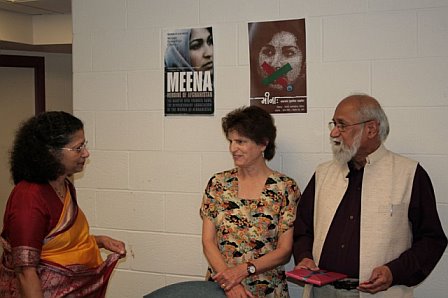 Shobha Chitre and Dilip Chitre - Translators with Melody, the original author of the book. 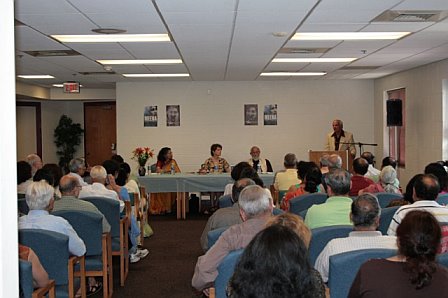 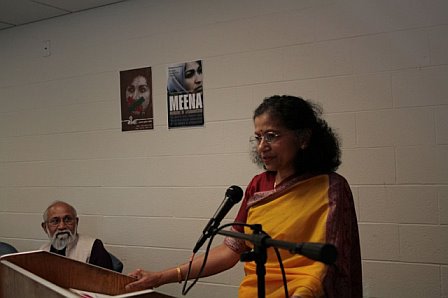 Shobha Chitre - author's view point. Expressing need for this story to reach larger readership. 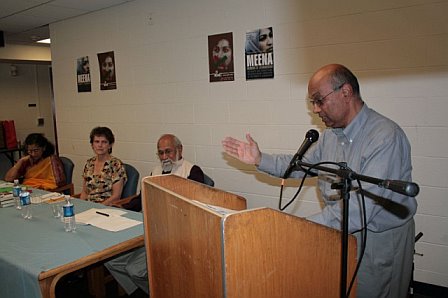 Dr. Sudhir Wanmali. Comparing the translation with the original book by Melody. 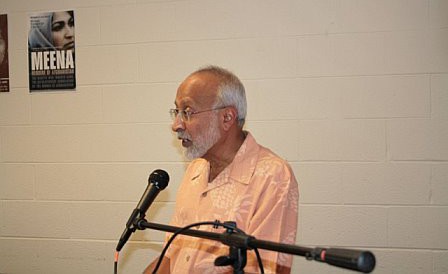 Dr. Vijay Deshpande reads RAWA's message to the ceremony. 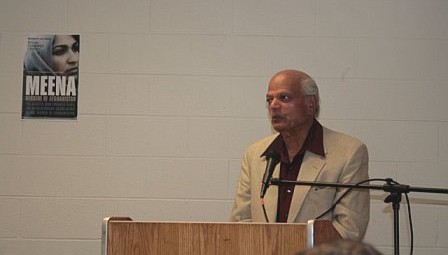 Dr. Prabhakar Tamboli - giving an account of Afghanistan he had seen and comparing conditions in the book. 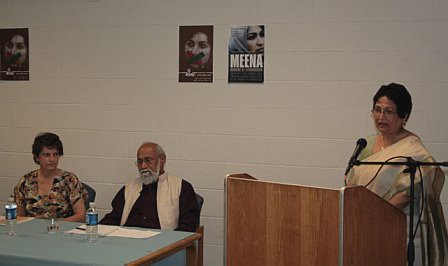 Dr. Anagha Barve - expressing humanitarian and social aspect of MEENA and her fight for Stree-Muktee. 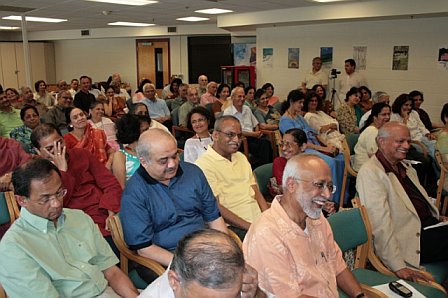 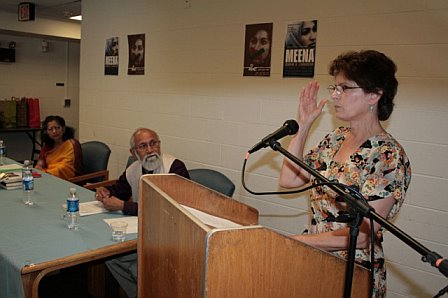 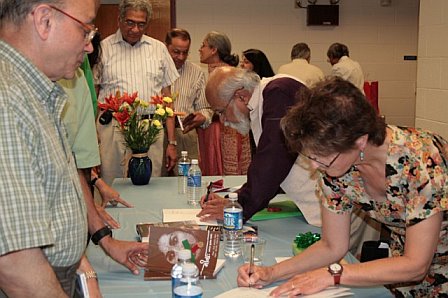 |